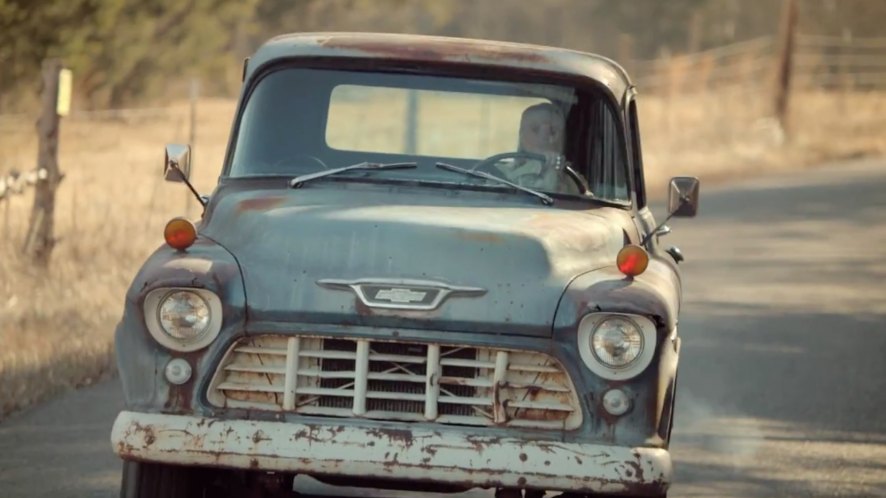
A recent survey published by money.co.uk about the prevalence of truck references in country music inspired a number of articles on what can only be described as the “truck song.” Although the percentage of songs with truck references over the years has varied, it has always been a popular theme. The truck song reached its height during the 2010s in a genre referred to as “bro country.” As described in a 2013 article in Entertainment Weekly, this country category is “basically a bunch of guys singing about trucks, headlights, rolled-down windows, jeans, alcohol, moonlit makeouts, and sex on the river beds beside old dirt roads” (Jones). The common theme in these songs is the ways in which a man’s truck serves as a site of sexual conquest. Bro Country represents a rather stereotypical and good ol’ boy type of masculinity. In these renditions, women [most often referred to as ‘girls’] do not drive the trucks; rather, they are prizes to be seduced by a bro in a lifted Chevy Silverado or Ford Super Duty F-250 King Ranch.
What is surprising, therefore, is that two of the top five streaming truck songs on Spotify are by women artists – Carrie Underwood’s “Before He Cheats”, and “Automatic” by Miranda Lambert. In 2020, Detroit auto journalist Mark Phelan noted, women were responsible for about half as many truck songs as “the good ol’ boys.” But the messages found in songs composed by women differ from those of male country singers. Like singer-songwriters in a variety of genres, country music artists create songs out of their own experiences. As I argue in my work on the women’s car song, female artists alter the meaning of the automobile to fit their own life events. As I wrote, “car songs based on women’s experience […] contest the exclusive relationship of the automobile to masculinity as well as provide alternative and multiple ways to consider the meanings women ascribe to cars” (163). This would certainly hold true for songs about the pickup truck, a vehicle historically associated with masculinity, particularly of the ‘bro’ variety. Underwood and Lambert, country legends in their own right, provide two examples of the truck song created from women’s experience.
As I note in my work on female pickup owners:
Of all the vehicles produced for the American driver, perhaps none is more strongly associated with masculinity than the full size pickup truck. […] pickups are often accessorized with ‘decorative’ additions – women’s garters hanging from rearview mirrors, plastic testicles dangling from trailer hitches and mud flaps featuring large breasted women – to mark the vehicle as a male space. Pickup advertising often relies on masculine tropes and gender stereotypes with headlines such as ‘A diamond for her hand, a hemi for his foot’, and ‘Yeah, it’s good to be King’. Marketing has traditionally called upon terms such as hardworking, tough, strong and powerful to describe the truck as well as the man who drives it (136).

In “Before He Cheats,” the pickup is not only the site of a man’s infidelity, but serves as the physical embodiment of his masculine identity. To seek revenge for unfaithfulness, Underwood desecrates that which will hurt her lover the most – not his person, but the object through which he identifies. The vandalization of the truck is not a simple act of passion or rage; rather, each verse in the refrain describes a specific action intended to destroy a fragment of her lover’s manhood.
When Underwood sings, “I dug my key into the side of his pretty little souped-up four-wheel drive,” she is returning the hurt she endured through her man’s cheating. So as not to forget the woman he wronged, Underwood “carved my name into his leather seats,” to leave a permanent and unmistakable reminder of the man’s indiscretion. “I took a Louisville slugger to both head lights” has Shakespearean overtones. Shakespearean characters are often made blind – literally have their eyes ripped out – in order to prevent them from inflicting harm or engaging in wrongdoing. Underwood wants to insure her betrayer can no longer look upon nor be tempted by the “bleached-blond tramp” singing some “white-trash version of Shania karaoke.” And finally, Underwood belts, “I slashed a hole in all four tires,” an action taken to strip away the freedom and mobility his souped-up truck provides.
Miranda Lambert’s “Automatic,” on the other hand, is a nostalgic look at the past. As Lambert reflects in a Songfacts interview, the song is “about slowing down, taking a breath and remembering what it’s like to live life a little more simply.” The truck is a stick-shift, 3-on-the-tree, 55 Chevy in which Lambert’s father taught her to drive [and which she still owns.] It is a metaphor for a slowed-down life, in which folks took their time, did things by hand, waited in line, and had patience in relationships and love. Automatic, of course, refers to the easy-driving, effortless transmissions found in over 98% of cars on the road today (Wiesenfelder). It also suggests a life carried on without too much thought, where getting things easy is the norm. “Automatic” reflects on Lambert’s own road to success; she hangs on to the truck so as not to be forgetful of the road her life has taken and how she got there.
As these two examples suggests, unlike the bro country truck song, which centers on sexual prowess, braggadocio, and other characteristics of what could be described as a “redneck” masculinity, women’s experience, automotive and otherwise, is what drives the message of the songs women sing about trucks. Women’s lives, and their relationships with cars and trucks, differ from those of men. Those unique experiences are often reflected in the country woman’s truck song.
Lezotte, Chris. “Born to Take the Highway: Women, the Automobile, and Rock ‘n’ Roll.” The Journal of American Culture 36.3, (2013) 161-176.
— “A Woman and Her Truck: Pickups, the Woman Driver and Cowgirl Feminism.” European Journal of American Culture 38.2 (2019) 135-153.
Morris, Sylvia. “Sight and Blindness in Shakespeare.” Theshakespeareblog.com 17 Aug 2012.
Phelan, Mark. “Surveys Show Who Sings About Pickups Most, and Which Truck is No. 1.” Freep.com 24 Jan 2021.
Shrader, Stef. “Your Ears Are Right: Country Music is Singing Way More About Trucks Now.” thedrive.com 23 Jan 2021.
Smith, Grady. “Every Truck, Beer, and ‘Girl’ Reference of the Current Country Chart.” ew.com 18 Oct 2013.
Songfacts. “’Automatic’ by Miranda Lambert.” Songfacts.com. n.d.
Wiesenfelder, Joe. “Why Manual Transmissions Are Dying…and What’ll End Them for Good.” Cars.com 16 Jul 2020